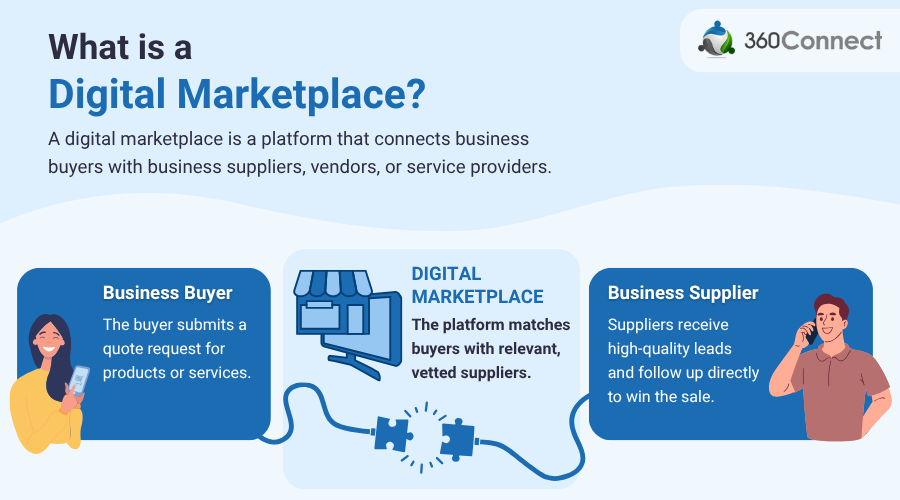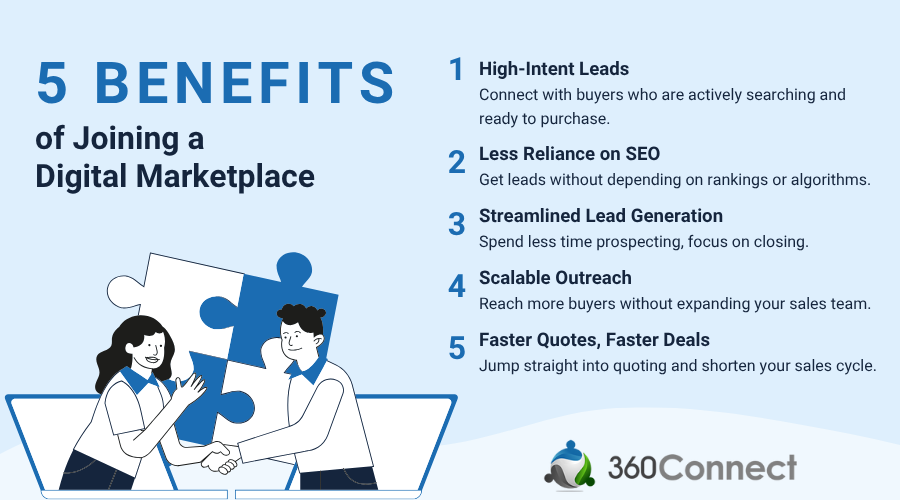The future of B2B sales has arrived, and it’s digital. Over the last few years, buyer behavior has shifted dramatically. Buyers are doing more research online, skipping traditional sales reps, and expecting convenient, transparent, and fast solutions.
That’s why digital marketplaces are gaining momentum.
If you’re still relying on cold outreach, referrals, or hoping your website gets found on Google, it might be time to rethink your strategy. Digital marketplaces are connecting buyers and sellers faster, smarter, and more cost-effectively than traditional methods, and they’re only growing.
In this guide, we’ll break down what a digital marketplace is, why it’s booming in 2025, and how it can help you grow your B2B business.
Key Takeaways
-
Digital marketplaces connect B2B buyers and suppliers in one place. Offering speed, transparency, and qualified leads.
-
In 2025, economic shifts and changing buyer behavior are driving massive growth in online marketplaces.
-
The benefits of digital marketplaces include faster lead generation, lower marketing costs, and scalable visibility.
-
Choosing the best B2B marketplace helps suppliers reach high-intent buyers and close deals more efficiently.
What is a Digital Marketplace?
A digital marketplace is an online platform where multiple suppliers can promote their products or services to buyers in one centralized place. Think of it like Amazon, but for business.
These marketplaces are designed to match buyers with the right sellers based on what they need, their location, and other preferences. The platform handles the discovery and comparison process so buyers can find what they want quickly, while sellers get access to pre-qualified opportunities.
For buyers, it’s all about speed, convenience, and control.
For sellers, it’s a streamlined way to gain visibility and convert leads, without building a massive marketing engine from scratch.
Note: A digital marketplace is also commonly referred to as an online marketplace, especially in search results or consumer-facing platforms.

Why Digital Marketplaces Are Gaining Momentum in 2025
It’s harder than ever to reach buyers on your own.
Let’s face it: SEO is more competitive. Google AI Overviews are pulling answers directly onto the search page. Ads are more expensive. And buyers are overwhelmed with options.
At the same time, economic conditions are pushing businesses to cut costs, re-evaluate vendor relationships, and find more value in every dollar they spend.
That’s why digital marketplaces are booming this year. They meet buyers where they already are, online, and give them a faster way to compare pricing, review options, and make smart purchasing decisions. Even large companies that once relied on long-standing vendor relationships are using marketplaces to shop around, find cost-saving opportunities, and adapt to remote-friendly business models.
Digital marketplaces aren’t just trending, they’re growing at a massive rate. According to a recent market analysis, the global digital marketplace industry was valued at $580.31 billion in 2024 and is projected to reach $1.06 trillion by 2030, growing at a CAGR of 10.6% between 2025 and 2030. That growth reflects what’s happening on the ground: businesses of all sizes are shifting to digital buying models. With economic pressure and tighter budgets, decision-makers are prioritizing platforms that offer speed, cost comparisons, and better vendor visibility. Exactly what marketplaces are designed to provide.
How Selling Through a Digital Marketplace Works
If you’re wondering how it actually works behind the scenes, here’s a simplified version:
- You join a B2B digital marketplace that aligns with your industry.
- You share your offerings, service areas, and sales preferences.
- The platform attracts buyers looking for those products/services.
- The marketplace matches leads with relevant suppliers like you.
- You respond directly to buyers and start the sales conversation.
Instead of chasing down cold leads, a digital marketplace does the heavy lifting. Delivering buyers who are already looking for what you sell.
7 Reasons Buyers (and Sellers) Are Turning to Digital Marketplaces
Digital marketplaces aren’t just a convenience. They’re solving key business problems for both sides of the transaction.
Here’s why they’re becoming a go-to solution:
Self-Service Convenience
Buyer behavior is trending toward self-service. In other words, buyers would rather independently search for what they need using convenient online tools rather than calling up suppliers every time they need to buy. In fact, research is showing that due to modern buying trends, buyers are more than halfway done making up their mind by the time they talk to a sales rep. And that statistic is only growing. Digital marketplaces are giving buyers the chance to search remotely on their own and briefly deal with the transaction with the supplier when they’ve made up their mind.
Controlled Choice
Buyers want to feel in control over their purchases, especially in this economic environment. Starting from scratch, so to speak, using search engines like Google is risky and time-consuming. Digital marketplaces give buyers a controlled environment where they can feel secure about choosing from a condensed list of suppliers catered to their needs. Learn more about why buyers prefer fewer choices in controlled environments.
One-Stop Shop
“One stop shops” online are becoming a go-to trend in the business world. It gives decision-makers the chance to view options that “match” with their needs all in one place. Additionally, it requires little time and effort on their part. It’s arguably the most convenient way to get a reliable roster of suppliers that can solve a buyer’s needs.
Speed
Nobody wants to wait days for a quote or chase vendors. Marketplaces are built for quick responses and fast turnaround, which is exactly what today’s buyer expects.
Remote-Friendly
With remote work here to stay, digital platforms are no longer optional. Buyers want to handle purchasing from anywhere. Marketplaces support that shift with entirely online workflows.
Cost-Saving Opportunities
Businesses are being asked to do more with less. Marketplaces encourage competitive pricing and give buyers options, often saving them 20–30% compared to traditional methods.
C-Suite Friendly
Procurement teams and executives love the simplicity. Instead of manually vetting vendors, they get a ready-made shortlist with pricing, timelines, and verified sellers.
5 Key Benefits of Digital Marketplaces for B2B Sellers
If traditional sales channels aren’t cutting it anymore, you’re not alone. Rising ad costs, tougher competition, and slower pipelines have suppliers looking for a smarter way to connect with buyers. That’s why digital marketplaces are becoming a go-to solution, especially for B2B companies that want results without building a massive in-house sales operation.
Here are five of the biggest benefits:

1. High-Intent Leads
Marketplaces attract buyers who are actively searching, comparing, and ready to purchase. You’re not cold-calling or guessing at intent, you’re responding to real opportunities.
2. Less Reliance on SEO
Ranking on Google has become harder (and slower). A digital marketplace gets you in front of buyers without needing to fight algorithms, optimize blog content, or manage expensive ad campaigns.
3. Streamlined Lead Generation
You don’t need to build a funnel from scratch. Marketplaces handle the awareness and discovery stages, so you can focus on closing deals, not chasing them.
4. Scalable Outreach
Need more leads? Turn it up. Need to pause? Scale back. Digital marketplaces let you grow at your own pace, whether you’re entering new markets or ramping up during peak season.
5. Faster Quote Requests
Buyers want fast responses. With a digital marketplace, the quote process is built in, making it easier to engage, quote, and convert before a competitor does.
Online Marketplace vs. Traditional Sales Channels
| Digital Marketplace | Traditional Sales | |
|---|---|---|
| Buyer Discovery | Handled by platform | Requires ads, SEO, or referrals |
| Lead Quality | High-intent, verified | Varies widely |
| Speed to Close | Faster | Slower |
| Cost to Acquire Leads | Lower (subscription or pay-per-lead) | Higher (ads, SDRs, cold calling, etc.) |
| Buyer Experience | Fast, convenient, remote | Slower, manual |
| Scaling Up | Easy to control and automate | Handled by the platform |
What to Look For When Comparing
Not all platforms are created equal. Before you sign up, here are the key things to evaluate:
- Industry alignment: Does the platform serve your exact niche?
- Lead quality: Are buyers pre-screened or just browsing?
- Targeting options: Can you filter by product type, geography, etc.?
- Pricing structure: Is it flexible, fair, and transparent?
- Account support: Do you get a dedicated rep or a hands-off dashboard?
- Supplier success stories: Are there real examples of businesses growing through the platform?
Related: How to Choose the Right B2B Lead Generation Company
Is It Right for You?
A digital marketplace works especially well if:
- You want more qualified sales leads without spending more on ads
- You’re expanding into new areas and need exposure
- You don’t have time to chase prospects
- Your team is small and stretched thin
- You’re tired of inconsistent pipeline volume
Marketplaces aren’t just for startups. Even experienced sellers use them to simplify their growth strategy and tap into new buyer segments.
Final Thoughts: B2B Is Changing—Don’t Get Left Behind!
B2B sales aren’t what they used to be. Buyers are smarter, more self-reliant, and more budget-conscious. That means if you’re not meeting them online, where they’re actively searching, you may be overlooked.
Digital marketplaces are built for the way people buy now. And they’re giving sellers an easier, more cost-effective way to show up, stand out, and scale.
Get Connected with High-Intent Buyers
At 360Connect, we help suppliers like you get in front of verified, ready-to-buy businesses every day. Whether you’re in construction, storage, tech, medical, or another industry, our digital marketplace connects you with the right buyers based on your products, location, and goals.
Ready to grow smarter? Join 360Connect today!
Digital Marketplace FAQ
Originally published by Catie Bonner in 2020, updated by Vanna Vasquez in 2025.

